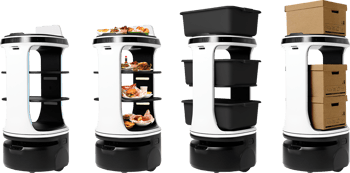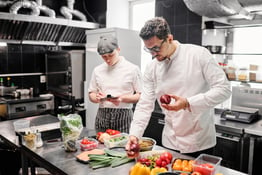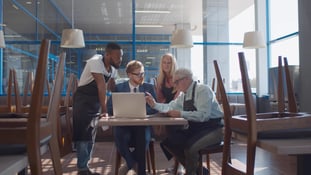You didn’t open a restaurant to become a tech expert, but here you are. And it’s not necessarily that your restaurant needs more tech, but it does need the right tech.
It’s easy for even seasoned operators to feel overwhelmed, from dealing with supply chain issues and rising costs to digital marketing and online ordering systems, the pressure to keep up can be a lot.
And while restaurant technology offers solutions, navigating the endless options of tools, platforms, and integrations often leads to more confusion than clarity.
That’s where speaking with a restaurant technology consultant comes in.
To better understand what restaurant operators gain from working with a tech consultant, we spoke with Spencer Michiel and Rachel Morgan, two Back of House restaurant tech experts who have worked closely with restaurants ranging from neighborhood cafes to large multi-unit operations.
Their perspectives reveal not just the how, but the why behind a tech consultation.
More Than Gadgets: What a Restaurant Tech Consultation Really Delivers
A tech consultation isn’t about selling new gadgets or pushing the latest software. At its core, it’s about assessing whether your current tools are actually serving your business goals, and identifying what might work better.
Spencer shared that one of the most common mistakes operators make is assuming that all restaurant technology is created equal.
He said, “Not all technology is a good fit for all restaurants. A single-location fine dining restaurant may not need a robust inventory and food cost system, but an eight-unit quick-serve chain absolutely does. Likewise, a small-town bar and grill might get by without ever thinking about their Google Business Profile, but in a major city you would need a comprehensive SEO strategy.”
Rachel echoes this, noting that many operators stop at the basics — like point of sale (POS), online ordering, maybe a loyalty program — and don’t realize the operational potential of an integrated restaurant tech stack.
“If you’re still relying heavily on spreadsheets, copying data between systems, or your team is constantly asking, ‘Where do I find this?’ — those are red flags,” she says. “Also, if you’ve added tools over time, but haven’t re-evaluated how they connect or overlap, it’s probably time.”
This mismatch between tools and needs can lead to wasted money, poor user experience, and inefficiencies that you may not even realize are avoidable.
Rachel added, “It’s not about telling you you’re doing it wrong, it’s about making sure you’re getting the most out of what you already have. We speak with many operators across North America, allowing us to offer insights beyond your four walls.”
When Is It Time To Talk?
So how can an operator tell when it’s time to reach out for a consultation?
Spencer advised, “If any critical system, like your POS, is underperforming, it’s time to do an assessment. Tech should never slow you down.”
Also, even if nothing seems broken, asking questions and staying informed is key. Sometimes people just want to educate themselves about what’s available, and that’s reason enough.
There’s also the belief that if things are working okay, there’s no need to look further. Spencer encourages restaurant operators to stay open to new options.
“Never be closed off to learning about new technologies,” he said. “There might be 99 products out there that don’t really help you, but there could be one that’s a game-changer for your business.”
More than anything, a consultation offers you that rare opportunity to take a step back from the day-to-day grind and see where improvements could be made.
Spencer said, “Anytime you receive an unbiased evaluation of areas that could help your business, it's an opportunity to gain perspective and make smarter decisions for long-term growth.”
What Actually Happens During a Restaurant Tech Consultation?
A restaurant technology consultation is not an intimidating, super tech-heavy process. Instead, it starts with a conversation that’s focused on your goals.
Spencer explained how restaurant technology consultants conduct the call. He said, “First, we go through a discovery call. That’s where we pinpoint exactly what technology changes or enhancements could be made at the restaurant.”
Depending on the operator’s needs, these conversations can be highly targeted or broader in scope. Spencer noted, “Sometimes the operator already has a clear idea of what needs to change and just needs help getting started.
“Other times, these sessions are more exploratory. We take a look at the existing restaurant tech stack and assess where updates or integrations might make a difference.”
Consultants typically ask foundational questions like:
- What current tech systems are you using?
- How do you track inventory?
- What parts of your business do you wish you understood better?
- What’s keeping you up at night?
- What’s slowing you down?
- What do your future plans look like?
These questions are designed to spark discussion — not to quiz operators, but to highlight where solutions may already exist.
That’s the Problem — What’s the Solution?
Once problem areas are identified, consultants work to prioritize recommendations, weighing time, cost, and long-term benefit.
“We start with the discovery call, and then we go off and do research,” Rachel said. “We compare platforms, identify gaps or overlaps, and provide tailored recommendations.
“I start with impact,” she explains. “What’s going to make the biggest difference with the least amount of friction? Then I look at cost, ease of use, and whether the team will actually adopt it. The perfect software doesn’t help if no one logs in.”
Spencer said, “Cost and time to implement are definitely factors, but some technology is so foundational that it has to come first. The POS system is the most critical piece, and everything else branches off that. So we always start there before moving into other areas like inventory, marketing, or reporting.”
For many operators, this process is the first time they’ve had someone walk them through their systems objectively. That alone can provide clarity and relief.
Fixing Friction: Real Problems That a Smarter Tech Stack Solves
So what kinds of real-world issues can a tech consultation help solve? The answer: More than you might think.
“One of the most common and most overlooked operational challenges we see involves prime costs,” Spencer said. “Especially the cost of goods sold (COGS) and labor. These are the biggest controllable expenses in a restaurant, and the right tools can make a huge difference in managing them.”
Rachel agrees: “So many operators still track inventory manually or don’t track it at all. The right platform saves hours a week, reduces waste, and helps you understand your margins.”
Rachel highlights another often-overlooked area: scheduling. “Some operators still build their schedules in Excel or on paper. But modern tools can forecast labor, control overtime, and make shift swaps seamless. It saves time, improves morale, and usually pays for itself quickly.”
Another area where restaurant operators tend to underestimate their options? Spencer was clear: “A cloud-based POS system. Some operators are still holding onto legacy systems because they’re familiar, but the flexibility, real-time data, and integrations that cloud-based platforms offer can be game-changing.”

Download the Free POS Guide
Find the best POS system for your restaurant with this expert-vetted guide.
*Submitting this form will also subscribe you to our weekly newsletter. Unsubscribe at any time.
He also shared an example where a change made a big impact: “We worked with a large arena that needed accurate food and beverage costs. They had a unique challenge: their POS system didn’t integrate well with the cost tracking software they wanted. We were able to work with our vendor partners and ensure that the integration was not only possible but successful.”
These aren’t just hypothetical benefits. The right system used in the right way removes friction, empowers teams, and surfaces insights that directly impact the bottom line.
Beyond Buzzwords: The Real Impact for Restaurant Operators
So what kind of long-term value should restaurants expect from going through this process?
“We’re seeing more and more operators looking for detailed data on their food costs,” Spencer said. “Prices from suppliers keep rising, and it’s putting pressure on restaurants to get more creative with their menus and sourcing. Having that data in a usable, actionable format is critical.”
He also noted how digital marketing is evolving and becoming a necessary piece of the restaurant puzzle: “Marketing has become a digital-first world. Restaurants need a sound strategy to cut through the noise and tell their unique story.” The days of “if you build it, they will come” are behind us.
Rachel agrees, emphasizing that success isn’t about having the most tools, it’s about commitment. “It’s not any specific technology that gives you a competitive edge. It’s how well you use what you have. Operators who invest the time to fully learn their systems are the ones seeing results.”
A tech consultation helps restaurants better position themselves for the future by ensuring their tools and their strategies are built to scale and adapt.
“We help operators think beyond short-term fixes,” Rachel said. “Whether it’s choosing tools that integrate well or vendors that invest in innovation, the goal is to avoid lock-in and maintain flexibility as the business grows.”
Getting Results
As for results, Spencer said, “That’s a hard one to answer in broad terms. If we’re addressing a broken process, the results can be immediate. But for things like a new marketing strategy or optimizing food costs, it could take a year or more to really measure the ROI [return on investment].”
Even so, the financial benefits can be significant – and sometimes unexpected.
Rachel said that results vary, but some changes, like updating an online ordering menu, can show benefits within a week. Others, like improving inventory workflows, take longer but often bring significant savings and insight over time.
Spencer added, “We’ve seen operators who were overpaying for systems they didn’t need or weren’t using fully. In those cases, switching or streamlining saved them thousands of dollars. Those savings can go right back into staff, food quality, or growth.”
What the Experts Want You To Know About a Restaurant Tech Consultation
Spencer is quick to point out that beyond the systems and software, his favorite part of the job is the people. “Getting to know the restaurateurs,” he said. “This is a tough business filled with such great people.” Spencer reflects that helping them find solutions that make their lives a little easier is incredibly rewarding.
“My favorite part is creating a low-pressure space where operators can think out loud, ask questions, and get real answers,” Rachel said. “It’s not a sales pitch – it’s a conversation.”
And their advice to any operator, regardless of size or success? “Always reassess your restaurant tech stack.” Spencer said. “The restaurant tech world moves very fast.”
Rachel encourages operators to not go it alone. “Most tech challenges aren’t unique. Talk to other operators. You can save yourself a lot of time, and mistakes, by learning from what others have already figured out.”
In other words: What worked last year may not be your best option today, and what seems out of reach may be closer than you think.
Is It Time for Your Restaurant to Get a Technology Consultation?
If you’re reading this and wondering whether a tech consultation is right for your restaurant, consider this: The point isn’t to add more complexity – it’s to create clarity.
Whether you’re facing daily frustrations, planning for growth, or simply want to make smarter decisions, a consultation is fitted specifically to your operation.
You don’t have to be a tech expert. You just have to be open to asking the right questions and willing to explore the answers. Schedule a talk with Rachel, Spencer, or one of our other experts today.





